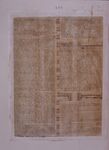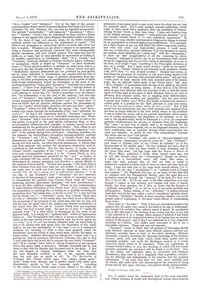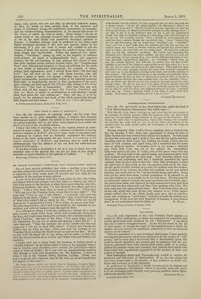< Two Critics of Theosophy (continued from page 4-233) >
longer exists. Madame Blavatsky has defined the “astral man” in a passage too long for quotation (Spiritualist, February 8th), and to that I must refer those who would like to estimate the care which “Scrutator” and “M.A., Cantab,” have taken to inform themselves of the opinions which they make haste to denounce. Madame Blavatsky had in that letter to deal with the blunder that the astral soul is the spirit. I fear she will despair of English intelligence when she finds that the next absurdity ascribed to her is the opposite blunder, that the soul has no spirit at all! In The Spiritualist of February 8th, Colonel Olcott says, “the adept’s astral spirit” (soul) “works with, through, and in perfect accord with either pure disembodied spirits or his own immortal spirit.” According to his critics, Colonel Olcott ought to have denied to the adept the possession of any astral spirit or soul at all, since the adept has not lost his immortal spirit. But I could multiply extracts indefinitely, which ought to have saved these gentlemen from the possibility of misconstruing Colonel Olcott as they have done. I have only dwelt so long on the subject because “Scrutator” “calls particular attention” to it, and accuses Colonel Olcott of “a very slanderous imputation.” It remains to be seen whether carelessness in bringing the charge is atoned for by promptitude in acknowledging its groundlessness. It is certainly not a light charge, as any one will admit who knows some good, worthy, and even very noble and high-minded persons, I could name, who are, or have been, physical mediums. It is only necessary to expose the mistake which identifies the “astral man” with the “elementary,” to show the utter inapplicability of all the reasoning by which “Scrutator” attempts to involve me in an inconsistency with Colonel Olcott for suggesting that the spiritless being or elementary, in or out of the flesh, is no longer “man” according to the Theosophic definition of man as a trinity. But I must notice another “spoke in our wheel,” which “M.A., Cantab,” thinks he has detected in my quotation (March 10th, 1876) from “a very learned occultist.” Because that writer, in describing the processes of evolution in the lower forms, speaks of all matter as “imbued with that vital principle called spirit,” and says that “each grain of sand, equally with each minutest atom of the human body, has its inherent latent spark of the Divine light,” this, says “M.A., Cantab,” is inconsistent with the loss of the spirit by the astral body, which is itself, at least, matter. If this were so, if the Divine spirit of man were identical with the principle of life, or with the latent spark of Divine light in the grain of sand, identical, that is, not only as affirming their common source, but as negating their differentiation, then is evolution alike needless and impossible. But this same writer I quoted says further on—“When this double evolution has reached a certain point, it is possible for the third principle to come into union, that is, the immortal spirit which makes of man a triad,” But if this ascent was not maintained, and this third principle had departed from the form no longer fitted for it, the form would return to the condition it was in before the union, and in its gradual dissolution (which means not, of course, annihilation, but dispersion of its elements, as in the case of the physical body) would be destroyed as a form, its component particles recommencing the process of evolution from the beginning. The “man” in such case is rightly said to be annihilated, for his individual consciousness depends, not on the dispersed elements, but on their combination into an organism through which consciousness can exist and manifest. So much for this “flat contradiction” between this writer and our New York friends.
I must return to “Scrutator,” who speaks of “this new-fangled and ill-defined term ‘elementary,’ not yet two years old.” Has “Scrutator” ever heard of Eliphas Levi, of the “Count de Gabalis,” or of the Rosicrucians of the middle ages? He has evidently not read a line of their writings, or of what has been written of their doctrines, and of the terms they used. Let him begin with the Dogme et Rituel de la Haute Magie, published, I think, about twenty years ago, and he will find enough about the “elementaries,” though not always, I admit, in a well-defined sense, still under that name, to make him wish, perhaps, that he had not been so ready to publish his confusion between what he does not know and what does not exist. I may also refer him to the same work (second edition, Vol. I., p. 262-3) for the idea (“annihilation”) so “entirely novel to Europe and America.” Mr. Maitland, who has, or, at least, at that time had no relations with the Theosophical Society, gave the same idea as a revelation received through his “Seeress,” in his book The Soul, and How it Found Me, If I do not refer to far older authorities, it is only because I cannot, at this moment, give chapter and verse of import wholly free from question, but I have no doubt that the doctrine of “potential immortality” is as old as it is, to my mind, probable and philosophical. Before talking of our “effrontery” in putting forward (and that even by the way, under a sort of compulsion) opinions which he dislikes, “Scrutator” should, at least, ascertain whether ours is the greater guilt of originating, or the more venial offence of transmitting these views.
Then there is “the babe.” Well, I have not committed myself to the opinion that the spirit only comes to the child at the age of understanding, though I do conceive that without reason it cannot be manifested. But, in fact, this part of the teaching of my society was new to me, and I only referred to it in a former letter, because I believed I had found what might prove to be historical evidence of its having been an ancient opinion of the church; and in this I am confirmed by a very competent authority, as I believe. The child’s early innocence is not to me a formidable objection. Sheep and oxen are innocent.
“Scrutator” seems to think that all students of Theosophy should hold identical opinions on these most difficult subjects, and that any difference amongst them is fatal to the whole teaching. Madame Blavatsky, expressly disclaims the thorough knowledge of the relations between spirit, soul, and body, which could alone render such an unanimity possible; and really the disclaimer, comical as it would otherwise sound, seems to be necessary. There are expressions in Colonel Olcott’s letters to you, the meaning of which I do not clearly perceive—probably my ignorance will be found to be the fault. But, on the whole, and especially taken in connection with Madame Blavatsky’s, they seem to me a singularly clear exposition, considering the difficulty and unfamiliarity of the subjects, and the requisite conciseness. I am sorry they have not been more carefully read by others, who make their own misconceptions the occasion of flying at him and all who agree with him, with epithets wholly unwarrantable.
Temple, February 24th, 1878.
<Untitled> (I cannot resist the impression)
I cannot resist the impression ...
Sir,—I cannot resist the impression that at this most important and critical juncture of occult and theosophical debate, there must be many, with myself, who are not able, by practical inductive means, to solve the points at issue, namely, those of the existence and power of elementary beings, the conditional immortality of humanity, and the wonder-working demonstrations of the human will-power on the Akasa, of which we read so much. These things I can by no means verify or see, although favoured with the constant assistance of one of the most highly and sensitively developed psychics in Europe. I, therefore, perhaps shall be pardoned by the many more highly developed advocates of this new and popular phase of the movement, if I give one word of advice and comfort to still the torrent of doubt and anxiety pervading the minds of many otherwise good, simple, pure Spiritualists. Before the improved (sic.) Spirittualism, “Occultism,’’ sprang up, with, to the majority of ordinary truth-seekers, its legion of undemonstrable facts, and unproven theories, the life and teaching of that perhaps best abused of men, that truly inspired writer, Andrew Jackson Davis, the “Poughkeepsie Seer,’’ were believed and accepted as being all-sufficient for the needs or even wants of harmonial philosophers, the majority of whom, judging from appearances, must, I should think, have “left their first love.” Let not such be the case with those, however, who, still possess a gleam or spark, even though a fading one, of faith in the grand incontestable, uncontrovertible, truths of our inherited immortal birth-right, so magnificently proved in that masterpiece of the seer’s early writings, the third part of The Thinker, fifth volume of The Great Harmonia, “The Law of Immortality.” After that they can well afford, with all due respect, to leave Isis Unveiled, Ghostland, and even Art Magic, to minds so constituted as to seek shadows “people often read about, but very seldom see.” They will not, it is to be hoped, let the substance and truth of the whole matter slip through their fingers and their brains.
8, Northumberland-place, Bath, Feb. 25th, 1878.
Will-Power
Sir,—In your impression of the 15th February there appears an article by Miss Kislingbury, in which she expresses her conviction that certain phenomena were produced by her “will-power.” I am afraid that she is under a misapprehension. As she did not resort to the aid of clairvoyance in testing the origin of the manifestations to which she alludes, she can scarcely be considered authorised to utter an advanced opinion on the subject.
With the assistance of a very developed clairvoyant, I have carefully investigated phenomena which were assumed to be the results of “willpower,” and in every case I discovered that a disembodied spirit, who could be clearly identified, was present and co-operating with the performers, influenced their wills without their being aware of it, accomplished the purpose which was intended, and inspired their minds with ideas which were superficially supposed to be the product of their own powers of thought.
Miss Kislingbury thinks that Theosophy was needed to explain the mysteries and difficulties of Spiritualism. If so, the new system has been very unsuccessful in its mission; it has produced as much confusion and nonsense as it has dispersed.
In preference to Theosophy, I would recommend, in its highest and simplest acceptation, Christianity; which, if devoutly tried, will prove to be an invaluable guide through every puzzling problem which Spiritualism can possibly raise.
Lambeth, Feb. 23rd, 1875.
Editor's notes
Sources
-
London Spiritualist, No. 288, March 1, 1878, pp. 105-6
-
London Spiritualist, No. 288, March 1, 1878, p. 106



